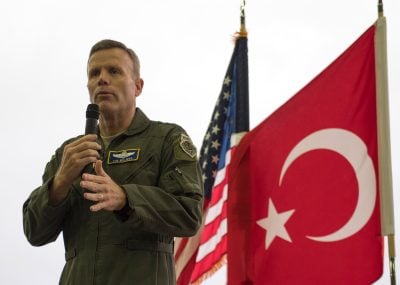EUCOM Commander Calls for Permanent Land, Air Presence on NATO’s Eastern Front

All Global Research articles can be read in 51 languages by activating the “Translate Website” drop down menu on the top banner of our home page (Desktop version).
To receive Global Research’s Daily Newsletter (selected articles), click here.
Visit and follow us on Instagram, Twitter and Facebook. Feel free to repost and share widely Global Research articles.
***
The United State’s top commander in Europe called for establishing a permanent land and air NATO presence on its eastern front and also stepping up the alliance’s air policing and its maritime presence in the wake of Russia’s invasion of Ukraine.
Air Force Gen. Tod Wolters, testifying Wednesday before the House Armed Services Committee, said the alliance’s rotational policy to deter the Kremlin has “got to change” to meet the challenges posed by Russia’s unprovoked attack on Ukraine.
Poland, the Baltic nations and members bordering the Black Sea “are very willing” to accept permanent NATO ground and air forces “from Tallinn to Sofia” and an increased naval presence “from the Arctic to the Aegean,” Wolters said.
Speaking Tuesday at an Atlantic Council forum, the presidents of Lithuania, Estonia and Latvia also called for an end to rotating “trip-wire” NATO forces to defend its eastern front. They too called for permanent stations from the Baltic to the Black Sea.
“This is a pivotal moment in Europe with generational implications,” Wolters said.
As he did before the Senate Armed Services Committee Tuesday, Wolters told the House committee he expected other allies and partners to follow Germany’s lead in meeting the NATO threshold of spending 2 percent of gross domestic product on national security.
This is happening “from Turkey in the southeast to Norway and Finland in the north,” he said. Germany’s, Canada’s and Finland’s decision to buy the F-35 Lighting II Strike Fighters provides the alliance with a “tremendous improvement” in aircraft capability to defend Europe, he added.
Terming Russia’s attack on Ukraine as an “unconscionable and illegal use of force,” Celeste Wallander, the Pentagon’s assistant secretary for international security affairs, said the administration is committed to bolstering Ukraine’s security through “months of sustainment.”
She told the House panel “this fight is going to extend” and the Biden administration is drawing down weapons stocks to ship to Kyiv and working with Congress to buy more weapons.
When asked, Wolters said anti-armor, anti-tank and surface-to-air missiles were Ukraine’s most pressing needs to stop and roll back the invasion, but “conditions change constantly.” Wolters said so far necessary supplies are flowing “by, with and through” Poland and Romania, but there are challenges that are being dealt with.
“This is America’s effort,” he added.
Like the directors of the Defense Intelligence Agency and the top general of Cyber Command, Wolters called the sharing of intelligence with Ukrainian counterparts and NATO allies bordering it “revolutionary” in its breadth and speed. “I’m comfortable, and I will always say that, but I want it to speed up. …It needs to continue to get faster.
Quoting Army Gen. Paul Nakasone, head of Cyber Command and the National Security Agency, Wolters said, “a great cyber offense starts with a great cyber defense.” That sentiment is at the heart of apparent Russian failures to successfully use cyber against the Ukrainians before the invasion and after.
Wallander and Wolters praised Transportation Command for delivering U.S. forces and equipment rapidly to Europe. Wolters said the command was able to move an entire armored combat brigade from Georgia to Germany in a week.
“That speed is unmatched,” he said.
Wallander said there were now 100,000 American service members either stationed or deployed to Europe or its waters. Washington is committed “to defend every inch of allied territory,” she said.
She said in addition this was the first time NATO implemented its strategic defense plan, moving large number of forces on and to the continent in response to a crisis.
Wolters added aircraft carriers in the Mediterranean Sea have played a critical role in the air defense architecture of the continent.
“We have seen NATO, EU and global partners unite to collectively push back against Russia’s invasion of Ukraine and efforts to undermine the rules-based international order,” Wolters said in his opening statement.
Wallander said even on the information front Moscow is suffering setbacks. “This is in contrast to 2014” when the Kremlin annexed Crimea and sent men, equipment and other aid to separatists in eastern Ukraine.
“The Russian narrative is non-plausible to the international community,” she said.
“Everything we’re doing in the information sphere needs to continue” and be strengthened, Wolters added.
Wallander said the administration is continuing to work with Slovakia and other former Warsaw Pact countries now in NATO on sending Russian-built S-300 air defense systems to Kyiv and having spare parts and additional systems shipped to Bratislava as replacements.
On sending Polish-owned MiG-29s to Ukraine, Wolters aid, “nations still continue to look at the issue.”
*
Note to readers: Please click the share buttons above or below. Follow us on Instagram, Twitter and Facebook. Feel free to repost and share widely Global Research articles.
John Grady, a former managing editor of Navy Times, retired as director of communications for the Association of the United States Army. His reporting on national defense and national security has appeared on Breaking Defense, GovExec.com, NextGov.com, DefenseOne.com, Government Executive and USNI News.
Featured image: U.S. Air Force Gen. Tod D. Wolters, U.S. Air Forces in Europe-Air Forces Africa commander, speaks during an all-call at Incirlik Air Base, Turkey on Dec. 6, 2018. US Air Force Photo

